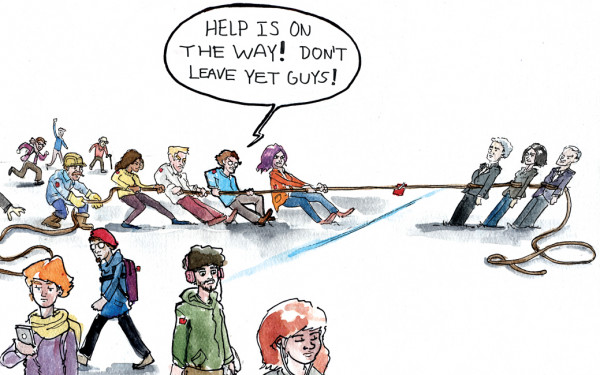Unofficial No Campaigns Take Root
With limited resources and no political experience to speak of, Ayanda Dube and Joseph Mynyenyiwa have emerged as the first unofficial “No” campaign in this year’s Student Union Building referendum.
For the past three weeks, Dube and Mynyenyiwa, both fourth year Concordia Students, have been visiting classrooms throughout the university and spreading opposition to the Concordia Student Union’s proposed $43 million purchase of a SUB.
“The CSU wants to fight tuition increases but on the other hand they want to ask for more of our money to buy a student centre,” said Dube. “It was that kind of ambiguity that caught my attention immediately.”
Concordia undergraduates currently pay $2.00 per credit towards a down payment on a SUB. In March, 72 per cent of Concordia voters rejected an additional $2.50 per credit fee levy that would have funded the purchase of a SUB.
Today, just eight months removed from the March election, students will face a referendum question asking them to approve a series of fee levy increases to buy and renovate a downtown building that would house a student centre.
“Students already voted overwhelmingly against this in March,” said Mynyenyiwa “Why bring back the same question but tweaked a little bit?”
As a testament to their political inexperience, the two fourth year students were unaware that they could have registered as an official No campaign with the referendum’s Chief Electoral Officer and received a $375 budget.
Despite this major misstep, Dube and Mynyenyiwa have blazed a trail for a number of other grassroots No campaigns to enter the political arena.
On Nov. 16, Sabona Madewa, president of the Political Science Student Association, tried to register a No campaign with referendum CEO Oliver Cohen. Her request was denied on the grounds that the registration deadline had been five days earlier.
“There are far more questions than answers about this student centre,” said Christina Vitelli, who is working alongside Madewa. “No one is telling us where the center would be [and] when the CSU advertises this to students they aren’t saying anything about cost. These are all important things to know before voting.”
Madewa and other PSSA members began posting “Vote No” signs throughout the university’s Hall building without the CSU’s consent. The posters were promptly removed, but Madewa enlisted the help of Gonzalo Nieto to set up and administer a Facebook event for their No Campaign.
Thus far, 431 people have confirmed their attendance to the event compared to 155 attending the CSU’s Yes event.
Nieto, who is a member of the university’s überculture club, has been visiting classes and campaigning next to the Yes team in an attempt to compete with the CSU’s highly structured political machine. He said that even if an official No campaign existed, the CSU would have an unfair advantage over it.
“The CSU sent out an email to all the clubs asking us to promote the Yes campaign through their clubs mailing lists and in some cases to personal e-mail accounts,” he said. “That’s definitely not a resource any official No campaign would have access to and as such is a breach of the CSU’s standing regulations.”
So far, each unofficial No campaign expressed concern over what they perceive as a lack of information from the CSU about having their campaigns legitimized and budgeted by the referendum’s CEO.
“We spoke to a CSU executive a few weeks ago and he never told us about the possibility of forming a No campaign,” said Dube.
CSU VP External & Projects Adrien Severyns, who heads up the Yes campaign, said he would have liked to see an official No slate.
“I told [Cohen] to approve a No campaign even though the deadline expired,” said Severyns. “If there is no official No campaign, they aren’t bound by any of the election rules, but we are.”
Despite Severyns’ desire to see political opposition on campus, one CSU official reportedly told a student holding a “Vote No” sign in the Hall building’s mezzanine to leave the area and said he would consider calling security if the student didn’t leave.
“It’s really not the best way to acknowledge a No campaign,” said Nieto. “Even if it isn’t official, the CSU should acknowledge a student’s right to speak out even if he missed a deadline.”
This article originally appeared in Volume 31, Issue 15, published November 23, 2010.

__900_600_90.jpg)


__600_375_90_s_c1.jpg)
__600_375_90_s_c1.jpg)
2_1_600_375_90_s_c1.jpg)
